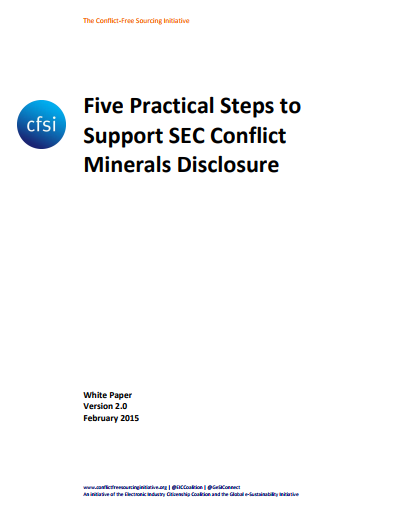Executive Summary
Profits from conflict minerals found in the Democratic Republic of the Congo (DRC) have supported conflict, human rights violations and labour and environmental abuses in the region for years. Companies that use these minerals in the design and manufacture of their products and components – called “downstream” companies – are concerned about these abuses, and are taking action to avoid contributing to conflict in any way.
Working in cooperation, Downstream Companies have developed a variety of policies and processes to better understand the origin of these conflict minerals to facilitate responsible decision-making about sourcing. Companies’ actions alone cannot ensure security, improve governance or bring about peace in the region. However, by finding shared solutions to common challenges in sourcing, companies can ensure they have as positive an impact as possible on the people and communities associated with minerals.
This paper is intended as a practical guide for Downstream Companies that have reporting obligations about conflict minerals that may be used in their supply chains. This paper may also be helpful for suppliers to better understand their customers’ expectations and requirements. This paper is not a set of rules or a method for compliance with existing legislation. Rather, this paper seeks to provide clear explanations and practical tips for companies on how to understand the source of minerals in their supply chains and how that understanding can contribute to their required reporting.
Currently, three major bodies of work address conflict minerals reporting: the United States Dodd-Frank Wall Street Reform and Consumer Protection Act of 2010 (Dodd-Frank Act); the related United States Securities and Exchange Commission Final Rule on compliance with Dodd-Frank (SEC Final Rule); and the OECD Due Diligence Guidance for Responsible Supply Chains of Minerals from Conflict-Affected and High-Risk Areas (OECD Guidance). This paper gives examples of how a downstream company may use the OECD Guidance to meet its SEC compliance and reporting requirements by correlating the OECD Guidance steps to the SEC compliance steps needed to meet U.S. reporting requirements.
Due to the fact that companies’ current conflict minerals reporting obligations are solely related to DRC conflict minerals, as defined in the Dodd-Frank Act, this paper focuses exclusively on DRC conflict minerals. Although the OECD Guidance applies to minerals from any conflict-affected or high-risk area, references in this paper to “conflict-free” should be understood as DRC conflict-free, which means the material does not directly or indirectly finance or benefit armed groups in the DRC.

